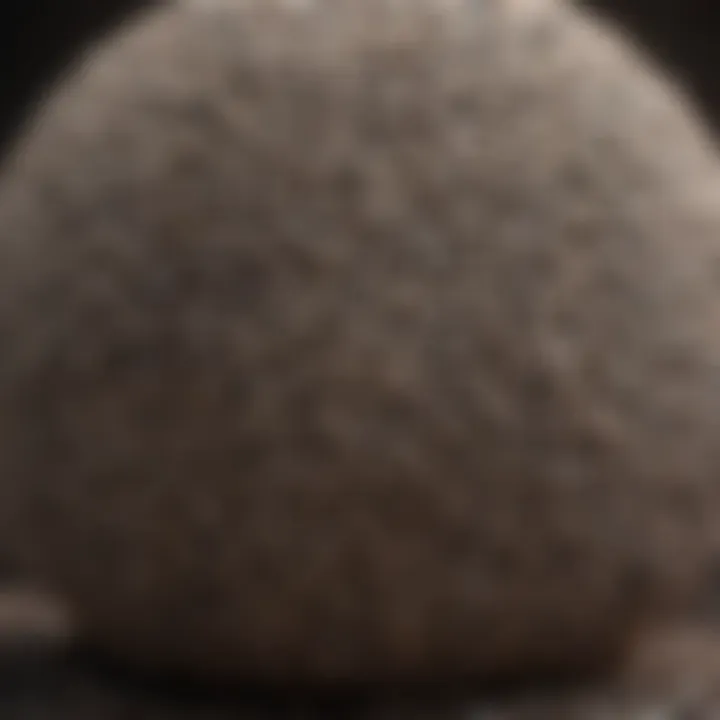The Vitamin Richness of Chia Seeds Explained


Intro
Chia seeds have gained popularity as a nutritional powerhouse. While many people are aware of their high fiber and omega-3 fatty acid content, the vitamin profile often goes overlooked. This article explores the vitamins found in chia seeds and their impact on health. By examining the specific vitamins present, their benefits, and the role they play in our diet, this piece aims to shed light on why chia seeds should be considered a valuable addition to nutrient-dense diets.
Key Concepts
Definition of Primary Terms
Chia Seeds: Small, edible seeds from the plant Salvia hispanica, known for their impressive nutrient content.
Vitamins: Organic compounds necessary for normal growth and metabolic processes, which the body cannot synthesize in adequate amounts.
Related Concepts and Theories
Chia seeds are not just a source of fiber and omega-3s; they also contain a variety of vitamins, including Vitamin A, Vitamin B, Vitamin D, and Vitamin E. Each of these vitamins plays a crucial role in maintaining health. For example, Vitamin A is important for vision and immune function, while B vitamins are essential for energy production and brain health. Understanding these vitamins' specific contributions can help in making informed dietary choices.
"The inclusion of vitamins from various sources is critical to achieving a balanced diet. Chia seeds offer a convenient solution to enhance vitamin intake."
Health Benefits of Vitamins in Chia Seeds
Vitamin A
Chia seeds contain beta-carotene, which the body converts into Vitamin A. This vitamin is vital for maintaining healthy vision, skin, and immune function. Including chia seeds in your diet can contribute to the recommended daily intake of this important nutrient.
B Vitamins
Chia seeds are a source of several B vitamins, including B1 (Thiamine), B2 (Riboflavin), and B3 (Niacin). These vitamins support energy metabolism, brain function, and cardiovascular health. A diet rich in B vitamins can also help mitigate stress and improve overall well-being.
Vitamin
While chia seeds are not a primary source of Vitamin D, their inclusion in a diet rich in other Vitamin D sources can support bone health and calcium absorption.
Vitamin E
This vitamin acts as an antioxidant, helping to protect body cells from damage. The presence of Vitamin E in chia seeds can help in supporting the immune system and reduce the risk of chronic diseases.
Future Directions
Gaps Identified in Current Research
Despite the known health benefits of vitamins present in chia seeds, there is limited research on the precise amounts absorbed by the body when consumed. Further investigations into the bioavailability of these vitamins could provide better insights.
Suggestions for Further Studies
Future research can focus on:
- The effects of chia seeds on specific health conditions related to vitamin deficiencies.
- Long-term impacts of consuming chia seeds on overall vitamin levels in the body.
- Comparative studies between chia seeds and other common nutriional sources to establish their position in human diets.
In summary, chia seeds are not only a source of fiber and omega-3 fatty acids but also a reservoir of essential vitamins. Their incorporation into diets can have positive effects on overall health, making them a noteworthy component of nutritional science.
Prelims to Chia Seeds
Chia seeds have gained attention for their remarkable nutritional properties. These tiny seeds are not only versatile in culinary use but also rich in essential nutrients, making them a valuable addition to many diets. The growing awareness of the health benefits associated with chia seeds has prompted interest in their vitamin content, contributing to advancements in nutritional sciences. In this section, we will explore the origin of chia seeds and their overall nutritional value.
Origin and Cultivation
Chia seeds come from the plant Salvia hispanica, which is native to regions in Mexico and Guatemala. These ancient seeds were a staple in the diets of the Aztecs and Mayans. They used chia for their high energy content and as a source of hydration. Today, chia seeds are cultivated in various parts of the world, including South America and Australia, due to their adaptability and resilience to different climates.
Cultivation methods have evolved over time to enhance yield and maintain quality. Farmers focus on organic practices to meet the increasing demand for health foods. The process involves planting seeds in well-drained soil with ample sunlight. It generally takes about three to four months for chia to mature before the seeds can be harvested. Sustainability of farming practices is emphasized, as chia seed farming can positively impact the ecosystems where they are grown.
Nutritional Value Overview
Chia seeds are well-known for their high nutritional value. They boast a comprehensive nutrient profile that supports overall health. These seeds contain a significant amount of protein, healthy fats, and fiber. But their vitamin content is especially noteworthy.
While chia seeds are often lauded for their omega-3 fatty acids and fiber, their vitamin profile deserves equal attention. The seeds provide important vitamins including Vitamin A, several B vitamins, Vitamin C, Vitamin E, and Vitamin K. This makes chia seeds a beneficial food source for those looking to improve their vitamin intake and are seeking natural alternatives to supplement their diet.
The nutrient density of chia seeds contributes to their health benefits, supporting immune function, skin health, and energy metabolism, among other things. Overall, the nutritional value of chia seeds highlights their role not just as a source of energy but as an integral component of a balanced diet.


Vitamins in Chia Seeds
Vitamins play a critical role in our diet, and chia seeds are a valuable source of several essential vitamins. Understanding their vitamin content assists in recognizing the health benefits associated with these seeds. This section explores the specific vitamins present in chia seeds, their functions, and how they contribute to overall health. The focus will be on Vitamin A, B Complex, C, E, and K.
Vitamin A
Importance of Vitamin A
Vitamin A is known for its essential role in maintaining vision, immune function, and skin health. It helps in the proper development of cells and is crucial for the maintenance of vision, especially in low-light conditions. Additionally, Vitamin A serves as an antioxidant, protecting cells from damage. Its significance in promoting healthy skin and supporting immune response makes it a beneficial component of a balanced diet.
Sources of Vitamin A
Vitamin A can be found in two primary forms: preformed and provitamin A. Preformed Vitamin A occurs in animal products such as liver, fish oils, and dairy products. On the other hand, provitamin A, primarily carotenoids, is abundant in plant sources including fruits and vegetables, especially those that are orange, yellow, and dark green. Incorporating these foods into your diet ensures adequate intake of this important vitamin.
Chia Seeds' Contribution
Chia seeds are not particularly high in Vitamin A compared to some other sources, but they do provide a small amount. The seeds contain beta-carotene, which the body can convert into Vitamin A. Therefore, they can contribute to the overall intake of this vitamin, especially when included as part of a varied diet consisting of colorful fruits and vegetables.
Vitamin B Complex
Roles of B Vitamins in the Body
The B vitamins play various essential roles in the body, participating in energy metabolism, red blood cell formation, and nervous system function. They are also critical for maintaining healthy skin, hair, and muscle tone. Understanding their collective roles highlights the importance of including B vitamins in daily nutrition for optimal health.
Vitamin B1 (Thiamine)
Thiamine is vital for carbohydrate metabolism and the functioning of the nervous system. It helps convert food into energy. A deficiency in thiamine can lead to health issues, such as beriberi, affecting the cardiovascular and nervous systems. Including thiamine-rich foods in the diet is essential for energy production and neural health.
Vitamin B2 (Riboflavin)
Riboflavin is significant for energy production and efficacy in cellular function. It aids in the metabolism of fats, drugs, and steroids. Moreover, riboflavin helps maintain healthy skin and eyes. Consuming adequate riboflavin supports overall health and wellness, making it a necessary nutrient in the diet.
Vitamin B3 (Niacin)
Niacin plays a fundamental part in DNA repair and the production of important hormones. It is also involved in energy metabolism. A deficiency in niacin can result in pellagra, which presents with symptoms including skin issues, digestive problems, and neurological symptoms.
Vitamin B6 (Pyridoxine)
Pyridoxine is vital for protein metabolism and the production of neurotransmitters. Adequate levels of Vitamin B6 support cognitive development and help in the regulation of hormones. It is important for maintaining mood and mental health, making it an essential nutrient for cognitive functions.
Folate
Folate is essential for cell division and is particularly important during periods of rapid growth, such as pregnancy and infancy. It helps in the formation of DNA and RNA and is crucial for the production of blood cells. Ensuring sufficient folate intake helps in preventing birth defects and supports overall health.
Chia Seeds as a Source of B Vitamins
Chia seeds contain several B vitamins in smaller amounts, which contribute to daily intake. They can be an excellent complement to a varied diet, providing these essential nutrients to support metabolism and overall health. However, they should not be solely relied upon for B vitamins, as a diverse range of food sources will provide the necessary amounts more effectively.
Vitamin
Function of Vitamin
Vitamin C is well-known for its role in connective tissue repair, immune function, and maintaining healthy skin. It aids in the absorption of iron and boosts the body’s ability to fight infections. This vitamin is vital for the synthesis of collagen, which is important for skin and joint health.
Antioxidant Properties
As an antioxidant, Vitamin C protects the body from oxidative stress. This property is crucial for preventing chronic diseases and promoting longevity. By neutralizing free radicals, Vitamin C helps to minimize cellular damage and maintain overall health, making it a necessary vitamin to include in a regular diet.
Chia Seeds and Vitamin
Chia seeds contain a small amount of Vitamin C, contributing to the overall intake. While not a primary source, including chia seeds in your diet can complement your Vitamin C intake, especially when combined with other sources such as citrus fruits and green leafy vegetables.
Vitamin E
Functions of Vitamin E
Vitamin E functions primarily as an antioxidant. It protects cells from damage caused by free radicals and supports immune function. Additionally, Vitamin E plays a role in skin health and the formation of red blood cells, contributing to overall health and wellness.


Skin Health and Antioxidants
Vitamin E is known for its benefits in maintaining healthy skin. It helps reduce inflammation and supports healing. The antioxidant properties of Vitamin E are significant for skin protection against UV damage and aging, making it a popular choice for skincare formulations.
Presence in Chia Seeds
Chia seeds contain a modest amount of Vitamin E. While they should not be the only source, they can contribute to daily intake, particularly when consumed in combination with other Vitamin E-rich foods, such as nuts and seeds.
Vitamin K
Role in Blood Coagulation
Vitamin K is crucial for blood clotting. It aids in the synthesis of proteins needed for blood coagulation and is essential for preventing excessive bleeding after injuries. Sufficient Vitamin K levels are required for maintaining proper blood health, making it a critical nutrient in the diet.
Bone Health
Vitamin K also supports bone health by assisting in the regulation of calcium in the bones and bloodstream. It is crucial in preventing osteoporosis and maintaining overall bone density, which is especially important as individuals age.
Chia Seeds and Vitamin K Content
Chia seeds contain a significant amount of Vitamin K. This contribution makes them an excellent addition to a diet for those looking to improve their bone health and blood coagulation capabilities. Including chia seeds can help meet the daily Vitamin K requirements effectively.
Comparison with Other Seeds
When discussing the nutritional benefits of chia seeds, it is essential to compare them with other seeds commonly found in diets. This comparison provides valuable insight into their relative advantages and drawbacks. Different seeds offer unique nutritional profiles that can complement a balanced diet. Examining chia seeds in relation to flax seeds and pumpkin seeds reveals how each can enhance overall nutrition.
Flax Seeds
Nutritional Comparison
Flax seeds possess their own distinct nutritional profile. They are high in omega-3 fatty acids, fiber, and lignans, which are beneficial for heart health. This makes them a strong candidate for inclusion in a nutritious diet. Compared to chia seeds, flax seeds have a higher lignan content, which contributes to their anti-inflammatory properties. However, chia seeds provide a better balance of soluble and insoluble fiber. This characteristic aids in digestion and makes chia seeds a favorable option for maintaining gut health.
Vitamin Content Analysis
Flax seeds contain several vitamins, but they lack the breadth offered by chia seeds. Chia seeds provide a wider array of vitamins, including various B vitamins and vitamin A. The inclusion of these vitamins may promote various physiological functions, such as energy metabolism and skin health. While flax seeds are indeed nutritious, they can not match the comprehensive vitamin profile that chia seeds provide, enriching diets with essential nutrients.
Pumpkin Seeds
Nutritional Value Overview
Pumpkin seeds are another noteworthy comparison. They are rich in magnesium, iron, and zinc, all of which support numerous bodily functions. However, their vitamin content is less diverse compared to that of chia seeds. While pumpkin seeds shine in mineral content, chia seeds encapsulate a holistic approach to nutrition, incorporating a variety of vitamins alongside the plethora of minerals. Therefore, while both seeds are healthy, chia seeds offer an overall balanced nutritional profile.
Vitamin Comparison
Examining the vitamin content of pumpkin seeds reveals they are particularly high in vitamin E and K. These vitamins usually play vital roles in immunity and bone health, respectively. However, pumpkin seeds generally lack the same amount of B vitamins when compared to chia seeds. The diversity of vitamins in chia seeds makes them a more complete option for health-conscious individuals.
In summary, while flax seeds and pumpkin seeds have their unique advantages, chia seeds stand out for their comprehensive vitamin content. By integrating chia seeds into a diet, individuals can benefit from a well-rounded intake of essential nutrients.
Health Benefits of Vitamins in Chia Seeds
The vitamins present in chia seeds contribute significantly to various aspects of health. While chia seeds are well-known for their high fiber and omega-3 fatty acids, their vitamin content also deserves attention. Proper intake of these vitamins is not just beneficial but essential for maintaining overall health. Here, we explore the health benefits associated with the vitamins found in chia seeds, illustrating their roles in supporting bodily functions.
Immune System Support
Vitamins play a crucial role in supporting the immune system. Vitamin C, in particular, is known for its role as an antioxidant. It helps in neutralizing free radicals that contribute to cellular damage. Additionally, vitamin A supports immune function by maintaining healthy skin and mucous membranes. These barriers help to prevent pathogens from entering the body. Chia seeds provide a natural source of both vitamins, enhancing the body's ability to fight infections and diseases.
Bone Health
Bone health is largely influenced by the intake of specific vitamins, especially vitamin K and calcium. Vitamin K is essential for proper bone mineralization. Studies have shown that a deficiency in vitamin K can lead to increased rates of bone fractures and decreased bone density. Chia seeds, rich in vitamin K, can thus be a beneficial addition to the diet for those seeking to strengthen their bones. This is especially significant for aging individuals who are at a higher risk of osteoporosis.
Skin Health
The skin is the body's largest organ and requires proper nourishment to remain healthy. Vitamins E and A are vital for maintaining skin health. Vitamin E has antioxidant properties that help protect the skin from damage caused by UV rays and pollutants, while vitamin A is crucial for skin cell production and repair. By including chia seeds in the diet, individuals can help promote healthier skin, as these seeds offer a good source of these vitamins.
Energy Production
Vitamins in chia seeds also contribute to energy production. The B vitamin complex, including vitamins B1, B2, and B3, plays a fundamental role in converting food into energy. These vitamins aid in metabolic processes that are essential for energy levels throughout the day. Consuming chia seeds can help to support energy metabolism, making them a smart choice for active individuals.


The rich vitamin profile of chia seeds provides multiple health benefits, supporting various bodily functions and overall well-being.
In summary, incorporating chia seeds into one's diet can yield several health benefits linked to their vitamin content. From supporting the immune system to promoting skin and bone health, as well as aiding in energy production, the vitamins within chia seeds serve to enhance overall health and wellness.
Practical Ways to Incorporate Chia Seeds
Incorporating chia seeds into one's diet continues to gain popularity due to their versatility and multitude of health benefits. Chia seeds are nutrient-dense, offering a range of vitamins and minerals that support overall health. This section explores various practical ways to use chia seeds effectively while maximizing their nutritional potential. Understanding how to integrate these seeds into different meals may enhance dietary diversity and promote optimal wellness.
Smoothies and Beverages
Chia seeds serve as an excellent addition to smoothies and beverages, enriching them with essential vitamins. When blended, chia seeds not only provide a pleasant texture but also amplify the nutritional value of the drink. For instance, adding one to two tablespoons of chia seeds to a smoothie contributes vitamin B, which plays a critical role in energy metabolism. Furthermore, their high fiber content can help maintain fullness, making it easier to manage hunger levels throughout the day.
- Preparation Tips:
- Soak chia seeds in water or juice for about 30 minutes before mixing them into smoothies. This promotes better digestion and gives a smoother texture.
- Pair them with fruits high in vitamin C, such as oranges or strawberries, for an extra nutritional benefit.
Baking and Cooking
Chia seeds can seamlessly fit into various baking and cooking recipes. Their ability to absorb liquid makes them ideal as a binding agent in gluten-free recipes. Chia seeds can be added to breads, muffins, and pancakes to enhance not only the flavor but also the vitamin content, particularly B vitamins and vitamin E, which support skin health and cellular function.
- Incorporation Methods:
- Replace eggs by mixing one tablespoon of chia seeds with three tablespoons of water, letting the mixture sit to thicken.
- Stir chia seeds directly into oatmeal or batter before baking to boost nutritional value.
Salads and Dressings
Salads and dressings are another excellent venue for chia seeds. Adding chia seeds to salads increases the dish’s vitamin B and E profile, making each bite more nutritious. When combined with dressings, chia seeds can also improve the texture and create a more substantial feel to the meal.
- Simple Ideas:
- Sprinkle chia seeds on top of salads for a crunchy texture.
- Mix crushed chia seeds into homemade salad dressings to thicken them while adding nutritional benefits.
Chia seeds are not just a health trend; they are valuable agents in improving the nutrient density of everyday foods.
Incorporating chia seeds properly can enhance many meals, making them not only more flavorful but also richer in essential vitamins. Consistent use of these seeds can lead to valuable dietary changes benefiting health overall.
Safety and Considerations
Understanding safety and considerations related to chia seeds is crucial. While these seeds are known for their numerous health benefits, it is essential to approach their consumption with awareness. This ensures that individuals can enjoy their advantages without facing potential risks.
Potential Allergies
Chia seeds are generally safe for most people. However, some individuals may experience allergic reactions. Symptoms can include skin rashes, itching, or digestive upset. Those with nut allergies should exercise caution, as cross-reactivity can occur with seeds.
Before introducing chia seeds into the diet, it may be prudent for individuals who have food allergies to consult a healthcare professional. This step is especially important for people with a history of severe allergic reactions. Monitoring one’s response to chia seeds is wise when incorporating them into meals for the first time.
Recommended Serving Sizes
Proper serving sizes are crucial for maximizing the health benefits of chia seeds while minimizing the risk of any side effects. Generally, a common recommendation is to consume one to two tablespoons of chia seeds per day. This provides a good source of nutrients without overwhelming the body.
Exceeding this suggestion, particularly for those not used to high-fiber foods, can lead to gastrointestinal discomfort, such as bloating or gas. Hence, starting with small amounts and gradually increasing intake is advisable for newcomers to chia seeds.
"Moderation is key when adding any new food to the diet, especially seeds rich in fiber like chia."
Epilogue
The discussion around the nutritional profile of chia seeds is not only pertinent for those interested in ingesting a healthful diet but crucial in understanding the broader impact of vitamins on well-being. Chia seeds stand out for their unique composition, specifically in vitamins, which play vital roles in many bodily processes. By recognizing these seeds as a valuable source of nutrients, individuals can make informed decisions in their dietary practices.
Summary of Nutritional Insights
Chia seeds possess an impressive array of vitamins that contribute significantly to overall health. The primary vitamins include Vitamin A, B-complex vitamins, Vitamin C, Vitamin E, and Vitamin K. Each of these vitamins has specific benefits:
- Vitamin A supports vision and immune function.
- B Vitamins are essential for metabolism, energy production, and neurological function.
- Vitamin C acts as a powerful antioxidant, crucial for skin health and immune support.
- Vitamin E helps protect cells from oxidative stress and supports skin integrity.
- Vitamin K is vital for proper blood clotting and bone metabolism.
Chia seeds offer each of these vitamins in varying amounts, making them a commendable addition to a balanced diet.
Future Research Directions
While the current findings on chia seeds are promising, future research can delve deeper into several areas. Studies may focus on the bioavailability of the vitamins in chia seeds and how they function in human health over long-term consumption. Specifically, exploring the synergistic effects of chia seeds with other foods could yield insights into enhancing vitamin absorption.
Revisiting the role of chia seeds in specific health conditions, such as cardiovascular and metabolic health, presents another avenue for exploration. Understanding how integrating chia seeds into various diets can help mitigate health issues would be beneficial for advancing nutritional knowledge. More robust clinical trials are necessary to substantiate the health claims associated with chia seeds further.
Culmination
In summary, the understanding of chia seeds' nutritional profile, especially their vitamins, reveals much about how these small seeds can produce significant benefits in a diet. Continued investigation will shed more light on their potential, ultimately influencing dietary recommendations and health outcomes. For more information on the nutritional benefits of chia seeds, further research and exploration are encouraged through platforms like Wikipedia, Britannica, Reddit, and Facebook.



